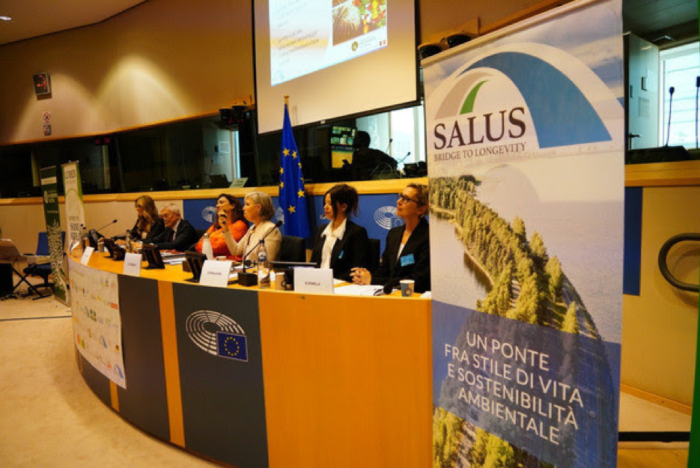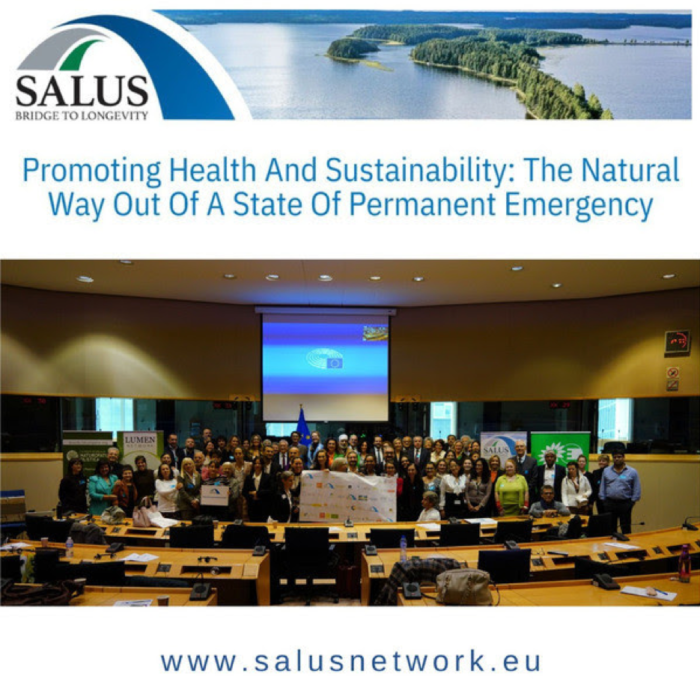Promoting Health and Sustainability: The Natural Way Out of a State of Permanent Emergency

Health promotion linked to environmental sustainability, that was the theme of an international conference taking place at the European Parliament in Brussels on 28 and 29 September 2022 thanks to MEPs Rosa D’Amato and Manuela Ripe and the Greens/eFax group. The need for a paradigm shift Day one was all about the urgent need to shift from a health system based on increasingly specialised crisis responses to a collaboration between health and non-health players who work together to promote health. Day two focused on education, health promotion and environmental sustainability. In 2021 SALUS European Network published a European Manifesto for healthy longevity observes that European increases in longevity have not been accompanied by corresponding increases in quality of life. The Conference presented studies and data how this might be possible. How promoting healthy lifestyles that unit human health and environmental health are the way.
Covid Responses as an example
Consider the response of European governments to Covid over the last two years. They lay bare systems vacuum. The emergency responses to the pandemic have not been accompanied by any significant interventions in health promotion that would have helped the populations to strengthen their natural immune responses.
The Presentations
Migraine prevention
Italian naturopath Milena Simeone, who created the SALUS initiative in 2019 defines this paradigm shift with the motto of ‘unite and collaborate’ (compose e collaborate). Simeone presented, among other things, the MINERVA project (Migraine and Naturopathy: Empowerment with nutrition, tentativeness and yoga). MINERVA aims to promote at EU level independent, non-profit research on the effectiveness of holistic naturopathy in the prevention and treatment of migraines.
Sustainable Health
The European Citizens’ Initiative (ICE) with the hashtag of #Time4SustainableHealth wants to collect more than one-million citizens’ signatures to ask the European Commission to recognise and support the central role of all those professionals who promote health and sustainability, to activate local experiments, to co-ordinate the Member States to increase investments in health promotion up to 5% of health and social budgets, to set up an independent research centre on health promotion and environmental sustainability.

Feasibility of the proposals?
The feasibility and workability of the SALUS’ proposals was examined by Dr Pikka Josiah, epidemiologist and research professor at the Finnish Institute for Health and Wellness (THL). The professor presented positive results from a consistent public campaign to promote healthy lifestyles in the North Karelia region of Finland since the 1980s up to today.
Examples from across the Globe
International speakers included the famous Indian activist Vandana Shiva who described how the agro-industrial model, characterised by monocultures and widespread use of chemical and accompanied by a reduction in biodiversity together with a ‘wrong diet’, strongly increases the incidence of chronic degenerative diseases and contribute to a reduction in the quality of life with advancing age.

Diet and environment intertwine
Professor Miguel Angel Martinez-Gonzalez, a Spanish doctor, epidemiologist, professor and researcher in nutrition who for twenty-five years has been engaged in research involving more than 22,000 participants demonstrated the importance of the traditional Mediterranean, both to ensure greater health and to ensure environmental sustainability.
Cultural pluralism
From the UK, Amarjit Bhakra, member of the APPG (All-Party Parliamentary Group) Indian Traditional Sciences (ITS) illustrated her commitment at Westminster to promote the parliamentary and public understanding of Indian traditional sciences (Ayurveda, Yoga, Jyoti’s, Vaastu, Unani and Sangeeta) in the UK and overseas and broaden and integrate medical pluralism into the NHS.
Integration is important
From Portugal, naturopath André Dorado focused on the importance of integrated medicine in the treatment of mental illnesses. “Integrating approaches such as mental exercise with existing health promotion and cardiac rehabilitation services,” he said, “can improve self-efficacy and long-term adherence to healthy behaviours, as well as improve personal skills of stress management “.
A shift to preventionDr Alberto Donella (the Alline are Sanit e Salute Foundation) is an Italian specialist in hygiene and preventative medicine, and believes an ambitious goal is possible: the gradual transition from a health system that pays for the disease to one that pays for generating healthy longevity. The way is to make being healthy profitable and create a “bridge between education and promotion of health”. Part of the proposal within the SALUS initiative is to involve non-health professionals in the health system, such as experts in traditional and complementary medicines, to collaborate with doctors in supporting citizens to achieve a change of lifestyle “
The conference also covered meditation and its positive effects on the quality of life as explained by Davide Padovano who teaches effective communication and meditation at the LUMEN network.
Legislation required?
An Italian parliamentarian, Dr Alberto Colizzi, presented legislation on the recognition of sustainable intentional communities as part of the SALUS initiative. These are people who come together around a purpose, a project and a common value that contribute to the good of a territory. “The environment and ecology always return as fundamental ingredients for the change of paradigm” he explained.
Sabine Matterlike (President of professional association ATEM), a German respiratory therapist illustrated the importance of respiratory therapy and respiratory education in general as well as in the treatment of depression and social isolation.
Environmental degradation as a cause of disease
The subject of environmental degradation as the origin of numerous diseases was the topic of Aude Verret from the French Centavo School of Naturopathy. In addition to the impact of poor nutrition, she stressed pathologies which could benefit from a medical/naturopathic collaboration, giving the emerging Centavo.
Switzerland leading the way
Davide Cascina
Naturopath and homeopath Davide Cascina (Director of Omeonatura) gave Switzerland as a positive example of progress. Switzerland was the first country in Europe, through a citizen vote, to ask for complementary medicine to be considered within the national health system. As a result, many Swiss naturopathic professionals, researchers and practitioners began to collect their research and practical experiences in manuals.
To gain full access to the conference proceedings of SALUS, subscribe to the SALUS newsletter at www.salusnetwork.eu.


